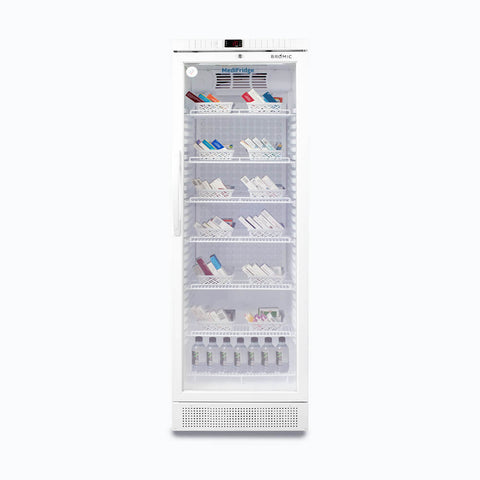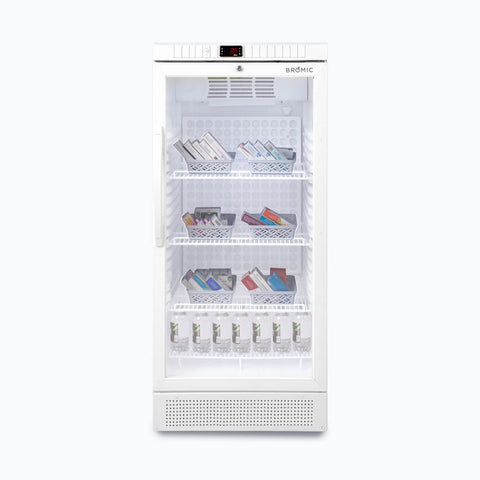
Recently Viewed


 Bromic MediFridge Vaccine Fridge - 145L MED0140GD-NR
Bromic MediFridge Vaccine Fridge - 145L MED0140GD-NR
595(W) x 595(D) x 824(H)mm


 Bromic MediFridge Vaccine Fridge - 372L MED0374GD-NR
Bromic MediFridge Vaccine Fridge - 372L MED0374GD-NR
595(W) x 598(D) x 1840(H)mm


 Bromic MediFridge Vaccine Fridge - 215L MED0220GD-NR
Bromic MediFridge Vaccine Fridge - 215L MED0220GD-NR
595(W) x 598(D) x 1210(H)mm
Commercial medical fridges are essential appliances for healthcare facilities, laboratories, pharmacies, dental clinics and other businesses that require safe storage of temperature-sensitive medications, vaccines, blood samples, and other medical supplies. These fridges are specifically designed to meet the stringent storage requirements of medical and pharmaceutical products, ensuring their integrity and effectiveness.
Key features of commercial medical fridges include precise temperature control, uniform temperature distribution, alarm systems for temperature deviations, door locks for security, and easy-to-clean interiors. Some models also offer features like data logging, temperature monitoring, and remote access for convenient management of stored items. These fridges are available in various sizes and configurations to suit the specific needs of different businesses.
Normal commercial fridges will fluctuate in temperature as much as 6 to 8 degrees however medical fridges are designed to fluctuate much less than this as little as one to 2 degrees which ensures that vaccines and other temperature sensitive medical products are kept at a consistent temperature.
For Australian business owners in the healthcare industry, investing in a commercial medical fridge offers several benefits. Firstly, it helps maintain the quality and efficacy of medications and vaccines by providing a stable and controlled storage environment. This is crucial for ensuring patient safety and regulatory compliance. Additionally, these fridges help reduce wastage of expensive medical supplies due to spoilage or improper storage conditions.
In terms of value for money, commercial medical fridges are designed to be durable, reliable, and energy-efficient, helping businesses save on maintenance and operational costs in the long run. The advanced features and high-quality construction of these fridges ensure consistent performance and longevity, making them a cost-effective investment for Australian businesses.
A Medical Fridge is a specific type of refrigeration unit designed for storing medications, blood samples, vaccines, and other medical supplies. These fridges are equipped with features to maintain specific temperature ranges and ensure the safe storage of sensitive medical products. They are typically used in healthcare facilities such as hospitals, clinics, laboratories, and pharmacies to adhere to strict regulations regarding the storage of medical items.
A medical fridge, also known as a pharmaceutical refrigerator, is specifically designed to store temperature-sensitive medications, vaccines, and other medical supplies. These units typically offer precise temperature control and monitoring to ensure the safety and efficacy of the stored contents. Additionally, medical fridges often have features such as alarms, door locks, and temperature logging capabilities to meet regulatory requirements.
On the other hand, a normal household or commercial fridge is designed for general food storage and may not offer the same level of temperature control and monitoring needed for medical supplies. Normal fridges are not typically recommended for storing medications or vaccines that require strict temperature adherence.
The cost of a medical fridge varies depending on the brand, size, and specifications of the unit. On average, a standard medical fridge can range from $500 to $2000 or more. It is recommended to contact us directly or visit our website for specific pricing and product details.
Medical refrigerators typically function similarly to regular refrigerators, but with a focus on keeping medications and biological samples at specific temperatures to ensure their efficacy and safety. These refrigerators are equipped with precise temperature controls to maintain a consistent and stable temperature range, usually between 2 to 8 degrees Celsius.
They are also designed to have enhanced temperature monitoring systems, such as alarms and data logging capabilities, to ensure that the stored items are kept within the required range at all times. Additionally, medical refrigerators often have features like door locks, temperature displays, and internal lighting to facilitate easy access and monitoring of the contents.
Overall, medical refrigerators work by employing advanced technology and specific design elements to provide a controlled environment that meets the stringent requirements of storing medical supplies and samples.
The requirements for a medical refrigerator typically include features such as temperature stability, accurate temperature control, alarm systems for temperature deviations, appropriate storage capacity, and easy-to-clean surfaces. Additionally, some medical refrigerators may need to meet specific regulations or standards set by healthcare organizations or government agencies. It is important to consult with a healthcare professional or regulatory body to ensure that the medical refrigerator meets all necessary requirements for storing sensitive medications or biological samples.
The life expectancy of a medical fridge can vary depending on several factors such as the brand, model, usage, and maintenance. On average, medical fridges are designed to last around 10 to 15 years with proper care and regular servicing. It is important to follow the manufacturer's guidelines for maintenance and temperature control to ensure the longevity and effectiveness of the medical fridge.
The normal temperature range for a medical fridge often falls between 2 to 8 degrees Celsius (36 to 46 degrees Fahrenheit). Maintaining this temperature range is essential to ensure the proper storage of vaccines, medications, and other temperature-sensitive medical supplies. It is advisable to regularly monitor and adjust the temperature settings to comply with specific storage requirements.